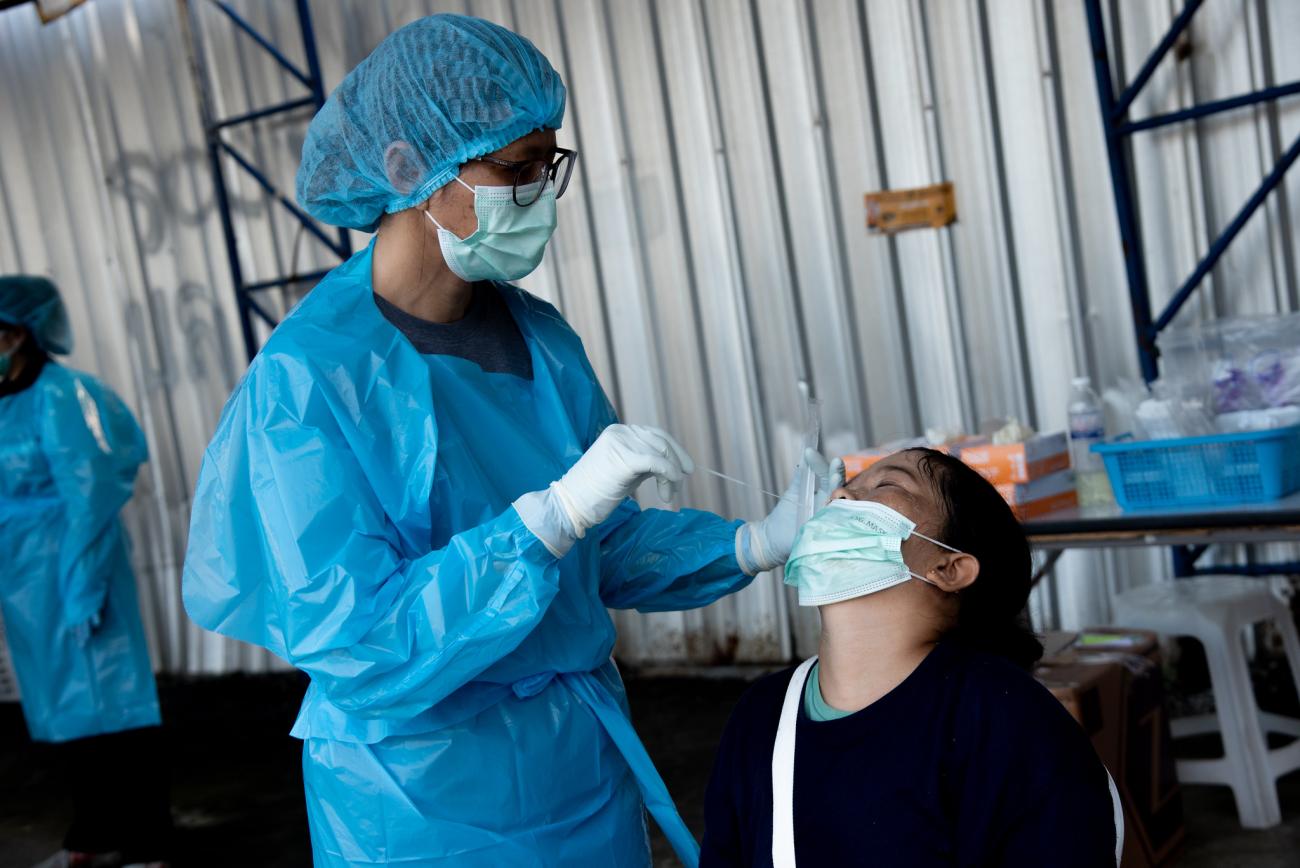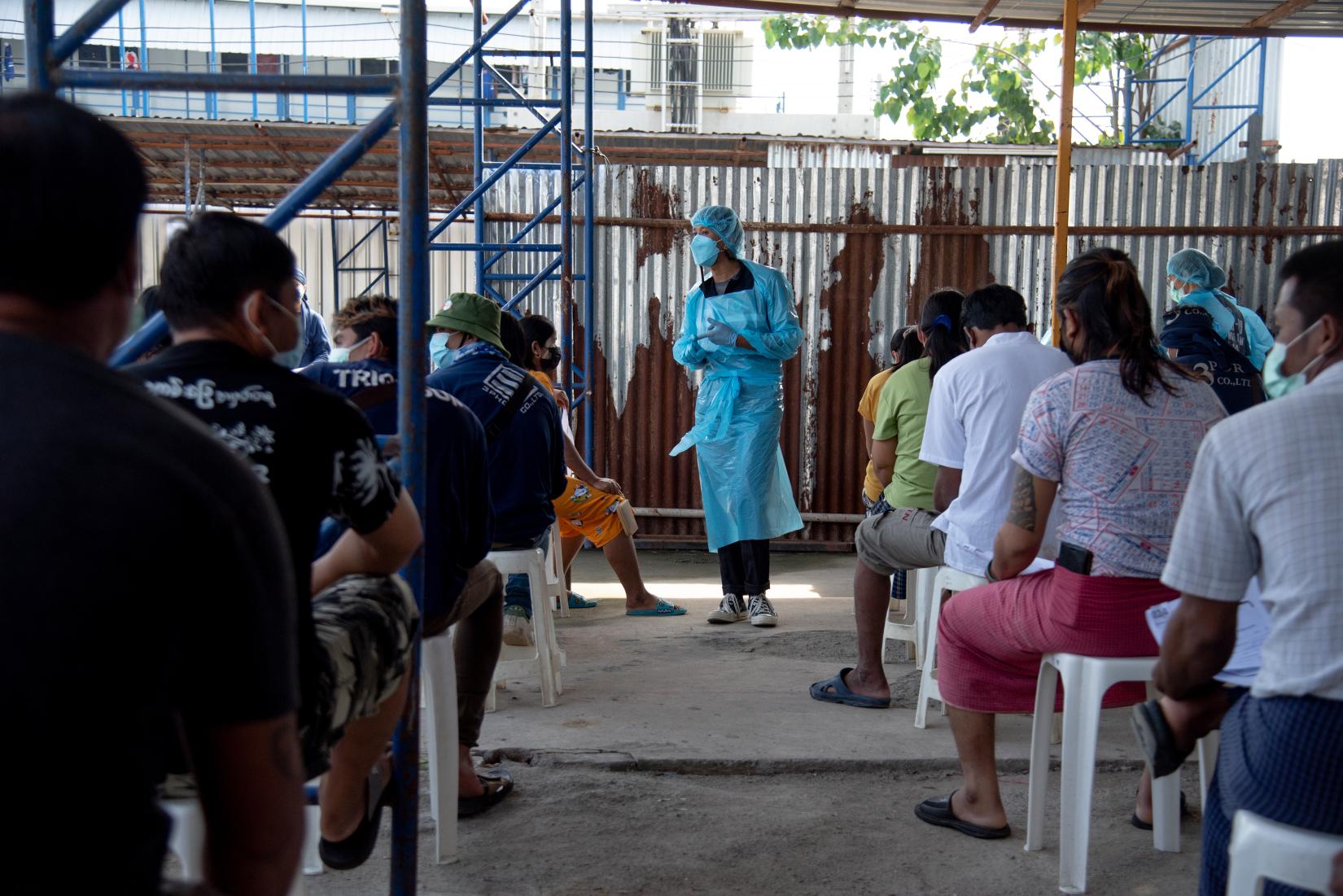Bangkok construction worker camp now COVID-19 free

ㅤ
A Bangkok construction worker camp, identified as a COVID-19 cluster and ordered to undergo lockdown in June, has become COVID-19 free after the World Health Organization (WHO) and partners equipped the migrant workers with knowledge and regular testing.
On Sunday, 31 October 2021, 402 construction workers were tested for COVID-19 at a construction workers’ camp in Bang Sue District in northern Bangkok. All test results turned out negative.

With the support from the European Union (EU), the mass testing, which lasted five hours, was organised by the World Vision Foundation of Thailand and the World Health Organization (WHO) Thailand under the EU – WHO South-East Asia Health Pandemic Response and Preparedness Programme for Thailand. The Thai Red Cross Society and the National Health Foundation donated the Antigen Test Kits (ATK).
The camp is one of 575 construction workers' camps in Bangkok. The workers, most of whom have been fully vaccinated, are employed to build condominiums across Bangkok. According to a survey conducted in June by the Bangkok Metropolitan Administration, there are 46,915 migrant workers and 34,148 Thai workers living in these camps. They work in 615 construction sites across Bangkok.

Some of the staff members who administered the test and provided counselling to the migrant workers are migrant health volunteers trained by World Vision, WHO and the Department of Disease Control under the Ministry of Public Health.
Myint Myint Win, a 29-year-old construction worker from Myanmar, said she received her second dose of the COVID-19 vaccine in October. Still, she and her fellow workers practised public health and safety measures by wearing masks and getting tested whenever tests were available. Asked how COVID-19 impacted her, Myint Myint Win said, "When some of us had COVID-19, we were not allowed to work for 14 days. Fortunately, we were paid during this period."

Kyan Thet Khaint, a 34-year-old migrant health volunteer, told WHO that his role was to train the migrants to protect themselves against COVID-19 while waiting for the results and to counsel anyone whose results turned out positive or had concerns and questions about COVID-19. He is also part of the group of volunteers who work as migrant hotline responders.
"Misunderstandings and rumours about COVID-19 are prevalent among the migrant community, so I told them to only get information from trusted sources or contact the migrant health volunteers and to not read and share rumours from social media," said Kwant Thet Khaint, who is also known as Patrick.
The training of migrant health volunteers and the COVID-19 testing for migrant workers are also part of the project funded by the EU and implemented by WHO and World Vision. Implemented in Bangkok and the four adjacent provinces, the project has trained 156 migrant health volunteers, provided 2,250 migrants with protective equipment, as well as providing 1,410 migrants with first-aid and essential items during their quarantine period.
Sarawut Rachasrimuang, Country Director of the World Vision Foundation of Thailand, said migrant health volunteers are keys to controlling COVID-19 in the migrant community. "Having migrants as our health volunteers is critical. They speak the same language as the migrants. Therefore, they can build trust and share the correct information with the migrants."
Dr Surasak Thanaisawanyangkoon, WHO Thailand's expert on migrant health, observed that the COVID-19 situation in the migrant community has improved remarkably compared to the situation in June. In particular, he saw a dramatic decrease in the positivity rates in testing from 30 per cent down to four per cent. This is because the construction companies worked closely with relevant stakeholders to protect migrant health by, following the Department of Health's preventive measure guidelines for workers’ camps that were jointly developed by WHO. Importantly, they also supported vaccination of their migrant workers. and Moreover, Dr Surasak added, many construction companies have provided an isolation and recovery site for migrants who tested positive. This helps to prevent the virus from infecting other migrants whose communal living puts them at high risk of infection and the possible formation of large clusters.
Original story published by WHO Thailand.

